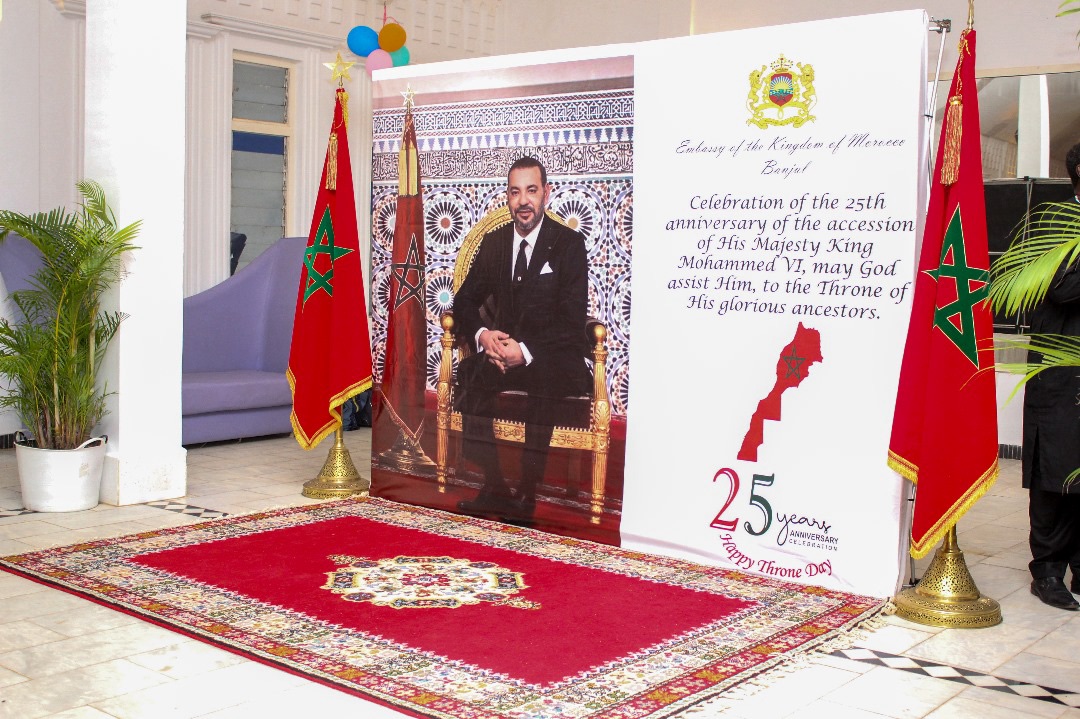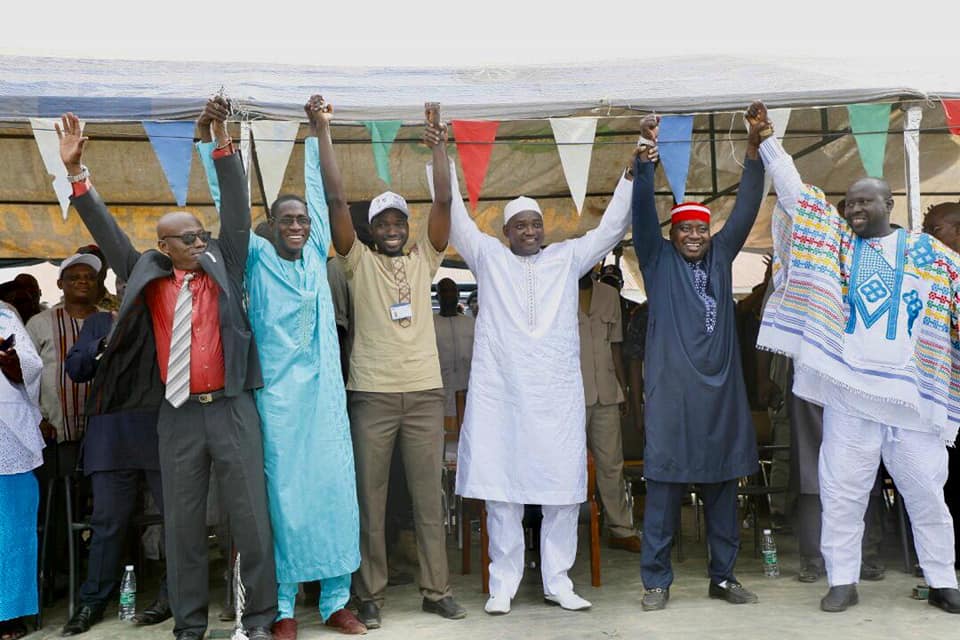By: Sandally Sawo
The 25th anniversary of the accession of His Majesty King Mohammed VI to the throne was celebrated in The Gambia in grand style.
Diplomats, senior Gambia government functionaries, venerable religious leaders, and representatives of regional and international organizations, among others, converged at the diplomatic compound of the Kingdom of Morocco to be part of the celebrations.
Speaking on the occasion, the Chargé d’Affaires of The Kingdom of Morocco in The Gambia, Mr. Ahmed Belhadj said: “Thank you for being with us this evening to celebrate the 25th anniversary of the accession of His Majesty King Mohammed May God Assist Him, to the Throne of His glorious ancestors.
“It is with great honor that I celebrate for the 2nd year this glorious event in this wonderful country, The Gambia.
I’m delighted to welcome among us all the personalities who have honored us with their presence, and all friends of Morocco who came today to share this moment so important to our hearts, and to share their frank and sincere friendship.”
Mr. Belhadj explained that The Throne Day is a commemoration of a common history, filled with a strong patriotic charge that reflects the perfect symbiosis between the Throne and the people.

“The celebration of this Day is also considered as a unique model of the sacred bond between the King and the people, as reflected in the ongoing process marked by modernity and a high sense of humanity along with strong ties of permanent allegiance and deep cohesion between the people and the Throne,” he further explained.
According to Charge d’Affaires Belhadj, since he accededto the throne in 1999, His Majesty King Mohammed VI has led a great era for Morocco with great achievements in various fields.
“After 25 years, the Moroccan nation has experienced great economic, political, social and diplomatic progress.
“During this period, the Moroccan Sovereign has made the Kingdom a true pole of stability in the region. Morocco has adopted thanks to the King’s vision, an inclusive and democratic approach making human development a main priority,” he explained.
Mr. Belhadj pointed out that many projects have been initiated under His Majesty in terms of economic development and infrastructure.
“Green Morocco, industrial acceleration, tourism plan, renewable energies, sustainable development, digital transformation etc. In order to support this development process in Morocco, HM King Mohammed VI launched in 2003, the work of the Tangier Med Port which became, a few years later, one of the largest economic projects in the Kingdom. Tangier is also connected to Morocco’s capital Rabat and commercial hub in Casablanca by Africa’s first high-speed train service,” he stated. He went on: “After developing Tangier Med, Morocco launched a huge project in the southern provinces, namely the Port of DakhlaAtlantic which will be completed by 2028. In this context, Morocco continues to follow this dynamic by launching many big projects with a view to hosting the World Cup which will be organized jointly in 2030, with Spain and Portugal.”
He pointed out that Morocco has taken important measures to strengthen the rule of law and the protection of human rights.
“Morocco always demonstrated its commitment to international cooperation in addressing global challenges, including climate change and the preservation of our planet,” he explained.
Charge d’Affaires Belhadj said one of the pillars of the Kingdom’s foreign policy remains its commitment to the economic and social development of the continent.
“Over the past 25 years, Morocco has played an active role in the continent’s development. Through its actions of solidarity, its approach based on the principle of South-South cooperation, but also through its investments aimed at contributing to the creation of sustainable economic growth,” he stated.
“Morocco’s real attachment to this continent is illustrated by the many Royal Visits it has made to various African countries. Since 2000, Morocco has signed more than 1,500 agreements with more than 45 African countries.
In African trade, Morocco who has joined the African Continental Free Trade Area (AfCFTA) upon its launch in 2021, is becoming a strategic hub for the North Africa region and the entire continent.”
Mr. Belhadj explained that Morocco has actively sought to launch several large-scale development initiatives, together with other African countries based on a long-term vision that seeks the emergence of a new Africa: a strong, bold Africa that defends its interests.
“In this regard, we can mention among others, the Atlantic Initiative, launched by His Majesty King Mohammed VI to facilitate access for Sahel States to the Atlantic Ocean, stands as a distinctive framework aimed at fostering multidimensional African cooperation, ultimately paving the way for the emergence of a new, prosperous and stable Africa,” he explained.
“We should also point out the strategic importance of the Morocco-Nigeria Gas Pipeline project, which aims to contribute to the development of 13 African countries, including the Gambia, providing them with a vital resource for progress energy.

“In the field of education, Morocco has a long-standing tradition of investing in Africa’s youth dating back to the 1980s. Each year, over 7,000 students from several sub-Saharan African countries enroll in universities in Morocco, benefiting from scholarships., According to the latest statistics, Morocco welcomed more than 25,000 students from 47 African countries and around 5,000 of professionals vocational training in Morocco’s “centers of excellence”.”
He stressed that relations between Morocco and TheGambia are not only brotherly and friendly but that the two countries are also strong partners in various fields, thanks to consultation and coordination based on the principles of solidarity and mutual support.
“The Gambia is also a key partner to Morocco within the African Union and the ECOWAS and other regional and international instances in which the two countries coordinate and share the same view and vision of peace, security, and development in Africa.
He explained that the bilateral relations between Banjul and Rabat this year were marked by several visits by delegations from various ministries and institutions.
“Last January, the two countries held the 3rd Joint Cooperation Commission in Dakhla during which 11 agreements were signed in different areas. Till date, 34 agreements have been signed between the two countries in various fields.
“In order to boost our relations, we are planning to organize a business forum for Moroccan and Gambian businessmen in order to explore business opportunities in the Gambia,” he stated.
“In this regard, I extend my heartfelt gratitude to the Gambian Government for its continued cooperation and friendship. We strongly believe that working together will achieve our common development vision and embed our relations in excellence.”





